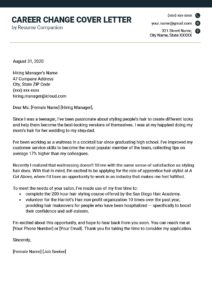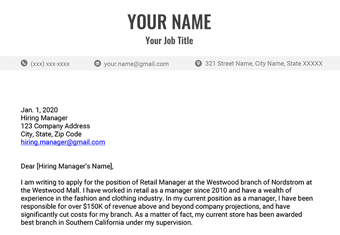Changing career paths is challenging. You need to convince an employer you’re the right person for a job you have no experience in. And at the same time, you have to compete with others who do have experience in that field.
Keep reading to learn how a strong career change cover letter can help you demonstrate your qualifications to employers as you switch careers.
How to Write a Career Change Cover Letter
When working toward a career change, your cover letter is key.
To be successful, a cover letter for a career change must explicitly acknowledge that you’re changing careers.
It also needs to persuade employers that you’re the best person for the job, despite your lack of experience in the field. In that respect, it’s similar to writing an entry-level cover letter, because it needs to help you break into a new industry.
There are four main strategies to bear in mind when learning how to write a cover letter for a career change:
1. Explain Why You Want to Change Your Industry
If you don’t explain why you’re changing careers, your application might confuse employers. They could assume you lack professional focus, or are failing in your current industry.
When explaining why you’re changing career direction, focus on the positives and downplay (or leave out) any negatives motivating you to leave your current industry.
Don’t include a laundry list of reasons you dislike your current career. That would be a major red flag to employers. Complaining about your job can backfire by giving the impression that you don’t adjust well and have trouble fitting in with a team. It also implies you’re more interested in escaping your current job than in launching a new career.
Instead, share what draws you to your new career. Describe why you’re a good fit, and detail your passion for it and how it complements your skills and abilities.
2. Showcase Your Passion for Your New Direction
You must showcase your enthusiasm for your new career. If you don’t show passion for your new career path in your application, employers might think you’re being wishy-washy. Alternatively, they might assume you’re desperate and are applying for any job opening you see.
So show you’re changing careers for a reason. After reading your cover letter, an employer should feel confident that you’ll stick to your new career path. They should get the impression that your new career path excites and engages you.
Sharing your enthusiasm for your new career path requires you to go beyond listing reasons why you’re a good candidate. Use your cover letter to tell a brief story about what drew you to this career to show you’re not only interested, but also invested in this new path.
3. Highlight Your Transferable Skills
Even if you’re switching to a career path that seems unrelated to your current one, there are still skills that will transfer. Communicate these transferable skills in your career transition cover letter.
Soft skills are required for almost every job in existence, so they’ll be transferable to your new career. Consider including the following skills if you use any of them in your current role:
- Communication skills
- Interpersonal skills
- Adaptability
- Teamwork
- Critical thinking
- Problem solving
- Punctuality
- Leadership skills
- Creativity
Some technical skills also transfer well, even between jobs in completely different industries. For example, employees across sectors use word processors, email clients, spreadsheets, and databases. More and more, social media and internet research skills are also important.
When describing your transferable skills, use details and examples. Explicitly describe how you gained those skills in your current career, and how they’ll transfer to your new career.
4. Prove You Understand the New Industry
Your cover letter should demonstrate you’re familiar with the industry you want to enter.
If an employer knows you understand their industry, they’ll be more likely to believe you’re truly passionate about the career change and not acting on a whim.
So describe how you learned about this new industry. Perhaps you took an in-person or online course, read books, listened to podcasts, or attended a conference. These details are valuable additions to your cover letter.
Demonstrating that you understand the new industry is a win–win. First, understanding the industry shows you’re knowledgeable enough to make the career switch. It also reinforces your message that you’re passionate about the new industry and motivated to become a part of it.
Career Change Cover Letter Sample

Career Change Cover Letter Sample (Text Version)Text Format
August 31, 2020 Hiring Manager’s Name Dear [Female Name] [Hiring Manager], Since I was a teenager, I’ve been passionate about styling people’s hair to create different looks and help them become the best-looking versions of themselves. I was at my happiest doing my mom’s hair for her wedding to my step-dad. I’ve been working as a waitress in a cocktail bar since graduating high school. I’ve improved my customer service skills to become the most popular member of the team, collecting tips on average 17% higher than my colleagues. Recently I realized that waitressing doesn’t fill me with the same sense of satisfaction as styling hair does. With that in mind, I’m excited to be applying for the role of apprentice hair stylist at A Cut Above, where I’d have an opportunity to work in an industry that makes me feel fulfilled. To meet the needs of your salon, I’ve made use of my free time to:
I’m excited about this opportunity, and hope to hear back from you soon. You can reach me at [Your Phone Number] or [Your Email]. Thank you for taking the time to consider my application. Sincerely, |
Conclusion
People often pursue new careers because they feel unsatisfied on their current path. Although there are obstacles to switching to a different industry, doing so can be rewarding.
Your cover letter is your secret weapon when changing careers. A high-quality career change cover letter can make the difference between successfully changing careers and languishing where you are. Invest in your future by writing a cover letter that presents you as a top-tier candidate.
Feel free to pattern your cover letter after one of our cover letter samples. If you’re short on time or need more guidance, try our cover letter builder and create a professional cover letter in just a few minutes.







